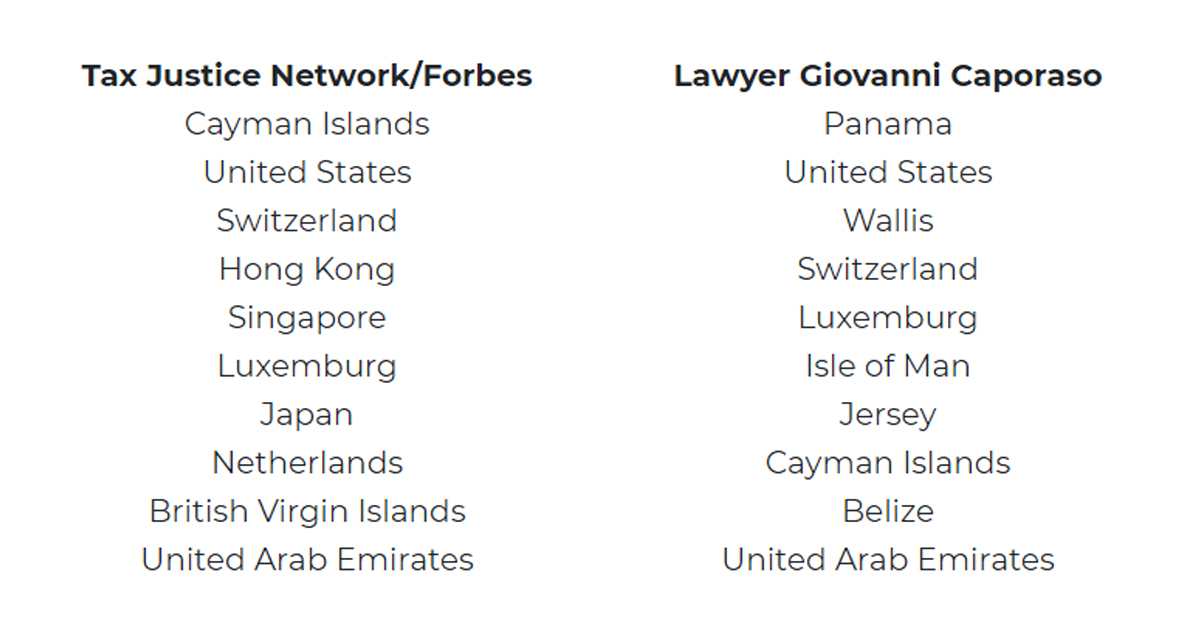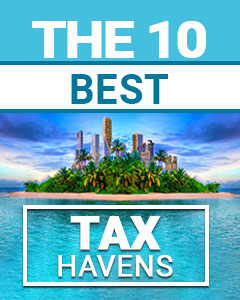
Table of Contents
Each tax haven offers some very specific tax advantages and almost all laws of the offshore companies are copies of Delaware’s. So, theoretically, one tax haven is the same as another.
In practice, choosing the best tax haven for your needs isn’t that simple. It’s advisable to hire a professional to create a structure that meets your needs. The best tax haven for Amazon isn’t necessarily the best for you!
The factors that influence the choice of tax haven are:
- Your fiscal residence;
- Your business;
- Your business’ initial capital and how much will deposit in the bank;
- The funds that you wish to assign to the structure;
- The countries with which you will work commercially (clients and suppliers).
Once the professional is in possession of this information, he can counsel you on the best tax haven. You have to be careful to not be negatively influenced by terror and misinformation from certain press campaigns: these days the “black-lists” are only for identifying the countries with low taxes or tax havens, and if your company is incorporated in one of the countries on the list, the fiscal authorities apply the investment of the proof related to actual fiscal residence of the beneficiaries.
In any case, we’ll analyze which are the 10 best tax havens and their advantages and disadvantages.
According to information published by the Tax Justice Network – also taken up by Forbes Magazine in its list of 10 countries that can be considered to be real tax havens – the parameter for understanding which are the best tax havens in the world is the financial secret index.
Personally, I don’t particularly agree because this evaluation is based on laws and regulations, but then, there are a lot of tricks in applying them and through a series of triangulations and fiduciary services, the index of the financial secret can be increased independently of the individual index of each tax haven.
For this reason it will be difficult to find two professionals or two specialized communication media that agree on ranking the 10 best tax havens. More, you have to keep in mind that specialized communication media base their judgement on public data, while professionals have their own classification based on their experience, knowledge, and applicable tricks of the trade.
In the table below, we’ll see how, for example, I don’t agree with the ranking of the Tax justice Network and Forbes.

How to classify a tax haven
My classification of the 10 best tax havens takes the following factors into account:
- Financial secret index
- Financial stability and ease for sending and withdrawing money
- The bureaucracy necessary for maintaining the offshore structure
- Price
- Location of the tax haven, keeping in mind both positive and negative factors.
Let’s see the countries that offer the best conditions for escaping from arbitrary tax systems.
Panama | Tax haven
Panama has an enviable geographic position, so much that the Panamanians say that the country is the “bridge of the world and heart of the universe”, it’s not in the area of either hurricanes or earthquakes. It has one of the oldest laws on offshore companies, given in 1932 and has been modified several times.
Panama offers an easy-to-obtain residence (in only 7 days); a passport for investors that a non-citizen can obtain in a few months; citizenship can be requested after 5 years of residence; immense economic facilitations for retirees; a retired Rentier visa that can be requested with only 18 years – if he has adequate capital; the communications and level of life are excellent; zero taxes on foreign income; reduced taxes and 7% VAT.
The level of secrecy of Panama’s offshore companies is estimated at 90%. Filling out an income tax return isn’t obligatory, presenting accounting isn’t necessary and, in practice, the only bureaucratic compliances are the payment of an annual Single Tax and of the Resident Agent (the lawyer).
Panama’s financial center has a good reputation, however due to international pressure, it has taken a series of measures make opening offshore bank accounts very difficult and once open, it continues to be difficult to operate with them. For this reason, I usually recommend that my customers use several bank accounts and that if they wish to keep only one, I recommend that they open the offshore bank account in another jurisdiction that isn’t Panama. The Republic of Panama has relatively low costs for offshore operations so it can be considered a low-cost tax haven.
United States | Tax haven
The United States could be in first place of the 10 best tax havens if it weren’t for the fact that the offshore banks are terrorized of opening accounts for American companies because of the possibility of being accused by Uncle Sam of encouraging tax evasion by people or businesses domiciled in the United States. Practically everything that can’t be done in offshore jurisdictions because they are penalized and put on blacklists, can be done in the United States if you aren’t a citizen or resident of the U.S.
Already in 1899 Delaware enacted a law on anonymous companies that offer a level of financial secret of almost 100%. The state of Delaware also offers tax exemption (state, not federal) and 50% of the companies quoted in the United States Stock Market and 60% of the businesses on the Fortune 500 list are registered there. Besides Delaware, other states, like Wyoming, Nevada and New Mexico, have introduced legislation on limited liability companies and offer favorable tax regimes.
In these companies, the beneficiary or owner aren’t identified in public registries, nor do they ask for documents; but, as I said before, it’s almost impossible to open an offshore bank account with an American company. However, this problem can be resolved by incorporating a business with the same name in an offshore jurisdiction so that it can operate with the American business and collect with the other.
However, the United States are a real tax haven for individuals of all countries that aren’t on the blacklist of the American Government. In fact, opening an offshore bank account in the United States is simple and done within an hour. When you send money, they almost never ask you where it comes from or why you received it. Further, the United States hasn’t signed almost any agreements for exchanging information on financial transactions. So, to keep your savings secure, the U. S. is, in my opinion, the number 1 tax haven among the top 10.
Wallis (France) | Tax haven
The community of Wallis and Futuna is an overseas French territory composed by 3 volcanic islands, with two governments: the French government and a native monarchy with limited powers. The economic system is governed by France, like the business registry, and taxes aren’t applied.
As the crow flies, the distance between Rome and Wallis and Futuna is 16,803 kilometers, like one and a half times the distance between Madrid and Buenos Aires. This tax haven is littleknown, even if it is in the same zone as other tax havens like Vanuatu and Nauru, which are excellent tax havens with a secret index of 100%; although this is not terribly reliable due to communication problems.
Wallis has good communications and also facilitates obtaining residence. The problem is getting there!
To open a company and bank account in Wallis, with an IBAN that begins with FR (France), there’s no need to leave home.
Wallis is obviously a prestigious tax haven with costs similar to those in Switzerland and Luxembourg, however, without the bureaucracy. What influences in the cost (some 10 thousand euros for an offshore structure) are courier and logistic costs, the local administrator and the company address, which compose 50% of the cost. An excellent option for those who don’t want to attract attention and want to take advantage of a white-list tax haven.
Switzerland | Tax haven
Switzerland has been a financial tax haven since forever. The gold and money of the Nazis and Jews, dictators and opponents, governments and secret services, etc., have passed through its vaults. Ever since the post-war period, those who have wanted to safeguard their belongings have Swiss companies and banks to protect their savings. Now, after the pressure from European governments, the clientele has changed: they threw out the Italians, Spanish, and French and brought in the Russians, Chinese, Latin Americans, and Arabs.
Switzerland is, without a doubt, a tax haven par excellence: neutral, stable, phlegmatic. The country maintains: a system with low taxes on activities – which in the Zug canton are just 8% – tax exemption on capital, and a bank secret that is still stable, even though undermined by a collaborationist legal power.
Geneva, the capital of the Canton with the same name, occupies the 13th place in the classification of the world’s most important financial centers regarding the volume of transactions. It’s not recommended for Europeans residing in the European Union.
Luxembourg | Tax haven
The giant, Amazon, has elected Luxembourg as its European headquarters. The Grand Duchy of Luxembourg is a Parliamentary Democracy within a Constitutional Monarchy: a small European country bordered by Belgium, France, and Germany with a population of only 600,000 inhabitants.
The financial center, which is, perhaps, the most famous tax haven, hosts 140 banks from 28 countries, several of which operate in Luxembourg, managing assets of more than 4 billion Euros.
Businesses like Apple, Nike, Disney, Skype, and GlaxoSmithKline have been able to save several thousand millions of Euros in Luxembourg. As you will have understood, this isn’t a tax haven within everyone’s range: its best advantages are a negotiable tax allowance, that can reach an offer of 1% taxation for the holdings of large groups. The incredible thing is that the Grand Duchy of Luxembourg isn’t on the OCDE or the European Union tax haven blacklist.
Luxembourg, which doesn’t consider itself to be a tax haven, has signed a large number of double taxation agreements and, as a member of the European Union (”EU”), benefits from the advantages offered by Europe’s distinct directives regarding taxation.
This tax haven’s law on companies, which is in 5th place on my list of the 10 best tax havens, is extremely flexible. The particulars can manage, with adequate and expensive strategies, your private patrimony in Luxembourg, without paying taxes.
Isle of Man | Tax Haven
The Isle of Man is a dependent of the United Kingdom, with a local government that exercises their own jurisdiction autonomously. With almost 85,000 inhabitants, Man or Mann offers a financial center with zero taxes on earnings from capital, converting it into a tax haven to all intents and purposes. Stamp duties, corporation and inheritance taxes are also absent. So, that is a great tax haven for protecting your capital; furthermore, you can retire when you are 50 years old!
Income tax is low, at 20%, with a maximum of 150 thousand Euros. The Isle of Man, just like the Channel Islands, Guernsey, and Jersey, isn’t part of either the United Kingdom or the European Community. This tax haven is generally used to reduce the taxable base of companies that belong to the same group, since their losses can be sold and used to reduce taxes on earnings of another company of the group. The Isle of Man continues to be a financial center, although it’s disappearing as a tax haven.
Jersey | Tax Haven
Jersey Island, like Guernsey, is also in the English Channel. Guernsey and Jersey are usually named together, since they are both Bailiwicks, or jurisdictions, dependents of the United Kingdom, which offer fairly similar fiscal advantages. Jersey was created as a tax haven halfway through the XX century when many British began to transfer their assets to these islands since no death tax was applied, which was at 80% in the United Kingdom.
Jersey, the largest of the Channel Islands, is a 45minute flight from the city of London. The island hosts a large offshore financial center in its capital, Saint Heliers, with offshore banks and fiduciaries. Offshore trusts continue to be a pillar of the economy of this small tax haven. The use of Jersey’s financial center as a tax haven is subject to triangulation since, just like the other tax havens in the Channel Islands, Jersey is subject to the OCSA’s transparency norms and has signed numerous information exchange agreements.
Cayman Islands | Tax Haven
The Cayman Islands are an archipelago of three islands in the Caribbean Sea, to the south of Cuba and are an overseas British territory. They are considered by many to be the number 1 tax haven in the 10 best tax havens. According to Financial Secrecy Index 2020, elaborated by the Tax Justice Network, the Cayman Islands are the first tax haven and the most capable of attracting capital of a legal origin, but also illegal. And it’s precisely for this reason that I dislike this tax haven; if it accepts illicit money, it is subject to sanctions and its banks can be blocked, losing their correspondents, becoming unable to operate, like happened recently in Saint Vincent and the Grenadines and in Belize.
There are currently some 10,000 investment funds, 130 banks, 150 trusts, and almost 700 registered insurance companies in the Cayman Islands: a total value of more than 7 billion dollars.
The Cayman Islands don’t charge corporate taxes or taxes aimed at their residents.
I consider the Cayman Islands to be a good tax haven for investment funds, hedge funds and insurance companies. Unfortunately, the high price of legal services and associated costs, and the slow answers of the majority of the local operators make using the Caiman Islands tax haven almost as expensive as operating in a European tax haven. And so, I personally don’t see its great advantages and the ratio of quality-price of the services is poor. The annual corporate tax is proportional to the declared capital and, therefore, it’s not competitive with the single set taxes applied in other tax havens.
Belize | Tax Haven
Belize is one of the most popular tax havens due to its low costs, the fast business registration (24 hours), and the high level of confidentiality that the country offers, thanks to a corrupt government, the bad communication and the endemic slowness. Belize, previously British Honduras, is an independent country, member of the Commonwealth. I consider it a good tax haven when referring to the business registry.
In recent years, the government of the Prime Minister and Financial Minister Dean Barrow, who has already completed two and a half mandates, and perhaps he’ll be leaving in October 2020, and together with the top management of the central bank of Belize, has achieved the destruction of the reputation of the financial center. During his second mandate, Barrow authorized the forced liquidation of two offshore banks, registered in Belize, making the money of many savers disappear in a long and costly liquidation directed by an inept and corrupt central bank, constantly changing the liquidators and never published the accounts of the banks placed in liquidation.
In spite of everything, the businesses of Belize are well-received, and the financial licenses are among the cheapest of all of the tax havens, and it’s to be hoped that at the end of 2020 the change in government gives a new impulse to this tax haven in free fall.
United Arab Emirates | Tax Haven
The United Arab Emirates are in style: the new promised land of the tax havens. Skyscrapers, luxury, efficient banks, easy residence and 40 free-trade zones have made the United Arab Emirates a very popular destination among the tax havens.
The United Arab Emirates are a state situated in the southeast of the Arabian Peninsula, composed of seven Emirates: Abu Dhabi, Ajman, Dubai, Fujairah, Ras al-Khaimah, Sharja and Umm al-Qaywayn. Anciently, the seven Emirates were known as the Trucial States, due to a truce imposed in the XIX century by the British on some sheikhs and emirs that slowed down piracy activities against the British ships passing through the stretch of sea under its jurisdiction.
So, we can say that the Emirates are a tax haven that, like the tax havens of the Caribbean islands, has a history of piracy.
Returning to the present there are no taxes in the United Arab Emirates like those in force in the countries with western type economies. The relocation of the businesses in this tax haven is facilitated in large measure by the almost complete absence of taxes on foreign businesses and companies.
To promote commerce, the United Arab Emirates have signed bilateral agreements and treaties against double taxation with many countries, among them: United Kingdom, France, Spain, Italy and many other countries of the EU.
There are still some difficulties: the high cost of life and offshore services; the mistrust of many western banks of working with banks in Arab countries; the obligation of a local administrator. In any case, I concede them a deserved number 10 place in the ranking of the best tax havens around the world.
Ranking of tax havens around the world
Obviously, there are many tax havens that could be included in the ranking of the 10 best tax havens, on a par with the others. In fact, I would say that to do a slightly more extensive classification of the 10 best tax havens, we could include some tax havens in prominent positions, but each one has specific advantages, so depending on the necessities of the classification, there could be significant ups and downs:
- Panama
- United States
- Wallis
- Switzerland, Monaco, Andorra
- Luxembourg, Netherlands, New Zealand, Liechtenstein, Bahrein
- isle of Man, United Kingdom, Ireland
- Jersey, Guernsey, Alderney, Herm, Kiribati (ancient Gilbert Islands), Lebanon, Liberia
- Anguilla, Netherlands Antilles, Cayman Antilles, Aruba, Bahamas, Barbados, Barbuda, Belize, Bermuda, Brunei, Cyprus, Philippines, Gibraltar, Djibouti (ex Afar and Issas), Granada, American Virgin Islands
- Belize, St. Kitts and Nevis
- United Arab Emirates, Hong Kong, British Virgin Islands, Macao, Maldives, Malaysia, Montserrat, Nauru, Niue, New Caledonia, Oman, Polynesia, Francesca, Solomon, Samoa, Santa Lucia, Saint Vincent and the Grenadines, Saint Elena, Sark (Island in the English Channel), Seychelles, Singapore, Tonga, Tuvalu, (ancient Ellice Island), Vanuatu.

